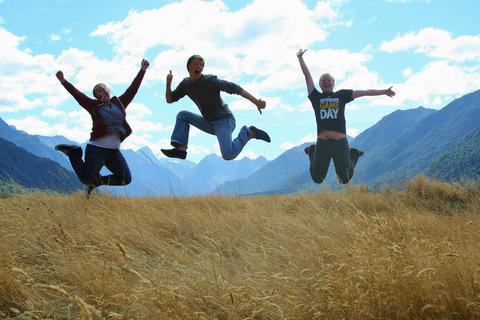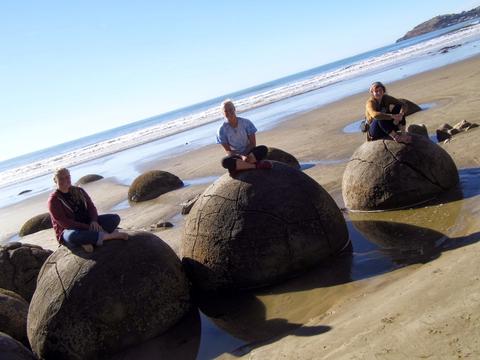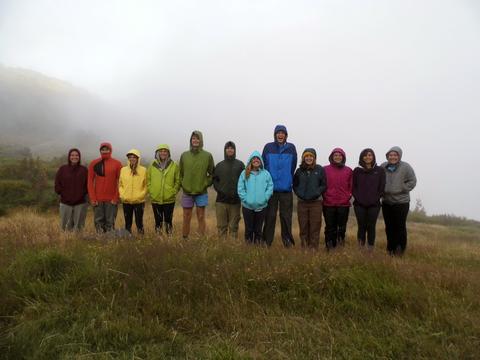Interview with a Dolphin Whisperer. Community Builder, and Creation Care Study Program Director
Being a part of and building community is one of Simply Earth’s top values. Making that happen can be a tricky task – it requires talking to people (terrifying for me), doing things with people (I love going but hate planning social events), and working to make relationships endure. My New Year’s resolution is to become better a small talk, one of the first steps in building relationships.
A few years ago I had the incredible opportunity to study abroad in New Zealand. I spent 3 months living in the most beautiful country in the world. I was never nervous about going because even though I didn’t really know what I was getting into, I knew that there was no way it was going to be anything besides awesome. I was 100% right. I went snorkeling almost every weekend, saw penguins, tramped beautiful mountains, but most of all I was a part of an incredible community. Here’s a tiny glimpse into some of my favorite moments.



One of the people behind the scenes in making these wonderful moments happen for me and students semester after semester is Courtnay Wilson (aka dolphin whisperer). Courtnay is the program director for Creation Care Study Program New Zealand. I interviewed her to find out more about how she helps enable moments like the ones captured above happen. Here’s the interview:
What is your favorite part of living in New Zealand?
Most of all, I love the scenery! I’m amazed by the diverse ecosystems. I also like how laid-back and down-to-earth Kiwis tend to be. Kaikoura is the most beautiful place I’ve seen. I know what it is to fall in love…with a place.
How would you briefly describe your job?
I’m the Program Director for a study abroad program called Creation Care Study Program (CCSP). CCSP is an interdisciplinary program focused on living well in the place where you find yourself. “Living well” encompasses all sorts of things…knowing where your food and water come from; getting to know the natural and human history of a place; being a good neighbor; learning to do for things for yourself so you’re not as reliant on an extractive global economy. All the courses students take here—Theology, Sustainable Community Development, Environmental Literature, and NZ Ecosystems—endeavor to help students live more authentically in their place.
What is your favorite part of your position?
I love a job that feels more like a way of life. Every day I get to be doing things that are life-giving for me…whether it’s having a cuppa with a student, helping in the garden, taking students out kayaking, or sitting in on a lecture. The line between work and life is blurred at times but that can be a beautiful thing.
What are the starting steps of building a community among students studying at the Old Convent?
I think the starting point is to be honest about the fact that there will be tensions, and that often tensions arise over the seemingly small things like taking out the rubbish or leaving dishes in the sink. Students and staff need to learn to be direct and honest in dealing with conflict rather than being “polite” about it. This is scary because it entails revealing our deepest selves, but the alternative of building walls to shield us from those who rub us the wrong way is even more scary.
CCSP is surrounded by an amazing Kaikoura community. I loved getting to know local people through activities, homestays, dinners, and worship. How did CCSP relationships with local Kiwis start? What makes these relationships so strong?
Most of the relationships started through the various churches in town. They really welcomed an influx of relatively young people. Over the years the relationships grew as time and energy was invested. The key in a small town is to stay rather than to go. Kaikoura is a tourist town and there are lots of transient people coming through. Locals start taking your seriously when they see you’re going to stick around.
What would you describe as the most important parts of building and/or being a part of a thriving community?
I think one of the most important things is to get out from behind our screens, whether that’s a phone, computer, or TV. Technology allows us to be together without really being together. If you can get away from that, you’re well on your way to being a thriving community. Also, doing work together helps, whether that’s making a meal, doing dishes, taking care of the chickens, etc.
You are known as a dolphin whisperer. What are some of your favorite memories of you and your kayak?
Ha. I once saw a southern right whale on Christmas Day. It breached about 12 times in the span of 90 minutes. Dusky dolphins were about and albatross were coming in for a look. That day was a gift.
If I remember right, you kayak almost everyday. I tell myself almost every week, “I’m going to get outside,” and it rarely happens. Why do you spend so much time outdoors? Is it a conscious effort on your behalf or something that you just do?
Well, I hardly kayak every day but I like to get outdoors most days. It helps having a job that allows me to do that. But there is some conscious effort involved. I don’t always feel like going out and being active but once I’m out on the water I never regret the decision.
What is your favorite quote?
This is a hard one to answer. I can’t remember who said it (maybe Thurman?): “Don’t ask what the world needs. Ask instead, “what makes me come alive”? Then do that, because what the world needs are people are are alive.” There’s also a quote by Mother Theresa: “do small things
with great love”. I like that.
If you could give one piece of advice to our readers what would it be?
Life is too short to be spending most of your day in drudgery. Find something to do that’s life-giving, and something which enables you to give back to your community. Try not to get caught up in the idea of a “career”.
There you have it folks, from the mouth of a dolphin whisperer: great advice on how to live your life authentically and make community happen. Things that I learned a lot about in New Zealand, but often forget back in the states. I love Courtnay’s challenge of getting away from screens and being willing to confront each other. In the year and a half that Lee and I have been married we moved twice. Being new to an area twice has really allowed me to appreciate the community I experience in New Zealand.
It’s something that I’ve been working for since moving. It definitely takes work. Giving Courtnay these questions and hearing her answers has been a great reminder & challenge for me (and hopefully for you) to do what it take to fall in love with the people and places where you live.
What steps are you going to do to live more authentically and build community?

